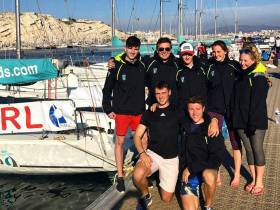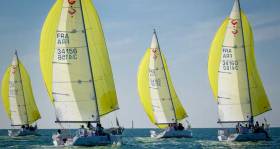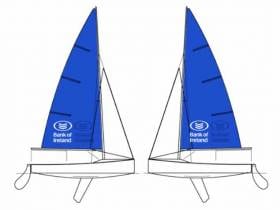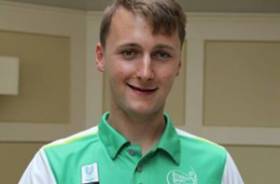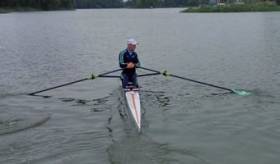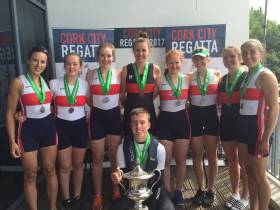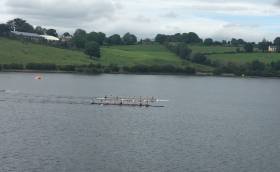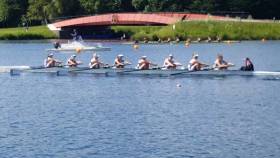Displaying items by tag: UCD
UCD Sailing Team Lying Fifth at Student Yacht World Cup in France
After a lively opening ceremony held on Tuesday night, the UCD Team Ireland had an exciting first day of racing today at the Student Yachting World Cup in France.
Enjoying moderate winds, the Race Officer managed to run five races today, including four inshore races and a coastal race.
The Irish representatives secured three third places, a fourth and a fifth. They lie in fifth place overall, with only five points between the first five boats.
With another four days of racing lying ahead, everything is still to play for.
UCD Sailing Team Compete at Student Yachting World Cup
UCD Sailing Team set off yesterday to compete in the Student Yachting World Cup, held near Marseille, France. Having qualified against stiff competition at the Student Yachting Nationals in April, the team will represent Ireland in the week to come. The five day event will consist of both inshore races, coastal races and a night race, all in Grand Suprise keelboats.
Skippered by Jack Higgins, the teams consists of Patrick Cahill, Conor Foley, Nicole Hemeryck, Lucy McCutcheon, Luke Murphy and Conor Kneafsey. Following an illustrious history of SYWOC podium finishes in the last ten years, the young UCD team hopes to bring home another medal for Ireland.
It has been a busy few weeks for UCD, with the SYWOC event and the first team racing event of the season (run by UCD in Wexford) falling in the same week.
UCD Sailing Club Get New Team Racing Sails
As the new year of University team racing sailing kicks off, UCD Sailing Club announces it has 'extended its partnership' with sponsors Bank of Ireland so the club sets sails with brand new North sails for its Dun Laoghaire based Firefly dinghies for the next couple of seasons.
Goff Misses Out on a Medal at European Under-23 Champs
#Rowing: Ireland’s Andrew Goff finished fifth at the European Under-23 Rowing Championships in Poland today. Jan Cincibuch of the Czech Republic won gold. He finished ahead of Austria, Slovenia and Turkey, who battled it out for the other medals, with Turkey’s Enes Yenipazarli missing out, though he had shown real guts to take on Cincibuch. Goff was not able to bridge the gap to this leading group.
The Ireland women’s eight are set to compete in their A Final in Kruszwica at 1.45 Irish time.
European Under-23 Championships, Kruszwica, Poland, Day Two (Irish interest)
Men
Lightweight Single Sculls – A/B Semi-Final Two (First Three to A Final; rest to B Final): 1 Czech Republic 7:34.58, 2 Ireland (A Goff) 7:37.64, 3 Sweden 7:42.26.
Semi One: 1 Austria 7:32.69, 2 Turkey 7:34.45, 3 Slovenia 7:40.16. A Final: 1 Czech Republic 7:44.38, 2 Austria 7:46.64, 3 Slovenia 7:48.58; 5 Ireland (A Goff) 7:58.72.
Ireland's Goff Secures Place in A Final of European Under-23 Champs
#Rowing: Ireland’s Andrew Goff has qualified for the A Final at the European Under-23 Rowing Championships. In beautiful calm conditions with a slight headwind in Kruszwica in Poland, the UCD man took a good second place behind Jan Cibuch of the Czech Republic. Goff started well and once Cibuch took over in the lead Goff stayed comfortably in touch. Sweden’s Filip Nilsson finished third.
European Under-23 Championships, Kruszwica, Poland, Day Two (Irish interest)
Men
Lightweight Single Sculls – A/B Semi-Final Two (First Three to A Final; rest to B Final): 1 Czech Republic 7:34.58, 2 Ireland (A Goff) 7:37.64, 3 Sweden 7:42.26.
Semi One: 1 Austria 7:32.69, 2 Turkey 7:34.45, 3 Slovenia 7:40.16
Goff Fights Through Headwind to Qualify for European Under-23 Semi-Final
#Rowing: Ireland’s Adrew Goff has qualified for the A/B semi-finals at the European Under-23 Rowing Championships. The UCD man finished third in his heat this morning in Kruszwica in Poland. Goff started well but, in difficult, headwind, conditions, he yielded the lead to Jan Cincibuch of the Czech Republic, who won well. Goff and Enes Yenipazarli of Turkey, who finished second, then firmly established themselves in the next two qualification places. This was by far the fastest of the heats, with all three qualifiers inside the winning time in heats one and three.
The weather has been extraordinary at the venue: the opening ceremony had to be cancelled because of torrential rain and the temperatures dropped from 30 degrees on Thursday to half that on Friday.
European Under-23 Rowing Championships, Kruszwica, Poland (Irish interest) – Day One
Men
Lightweight Single Sculls – Heat Two (First Three to A/B Semi-Final; rest to Repechage): 3 Ireland (A Goff) 8:21.00.
Big Win for UCD's Crowley and Lambe At Rowing Championships
#Rowing: UCD’s Eimear Lambe and Aileen Crowley had an impressive win in the women’s senior pair in the deferred finals at the start of the third day of the Irish Championships at the National Rowing Centre. Skibbereen and Cork were in the touch with the UCD women until 1500 metres, but Lambe and Crowley left the rest behind from there and won by 10 seconds from Skibbereen.
Queen’s were also impressive in their win in the men’s novice eight, and Sanita Puspure won the senior single sculls with plenty to spare.
The junior 16 men’s eight went to Enniskillen, who thus completed the set of wins: the junior 18 and 16 eights for men and women.
Irish Rowing Championships, National Rowing Centre, Day Three (Selected Results)
Men
Eight – Novice: Queen’s 6:21.56.
Sculling, Quadruple – Junior: 1 Three Castles 6:21.53, 2 Shandon 6:22.75, 3 Clonmel 6:23.05.
Women
Pair – Senior: UCD (A Crowley, E Lambe) 7:37.41.
Sculling, Single – Senior: Old Collegians (S Pupsure) 8:02.64.
Stars Come Out for Huge Irish Rowing Championships
#Rowing: A bumper weekend of racing is in store in Cork as the 2017 Irish Rowing Championships take place at the National Rowing Centre from Friday, July 14th to Sunday, July 16th. The event will showcase some of the best rowing Ireland has to offer with 1049 crews competing in 264 races.
The National Rowing Centre will welcome 60 clubs, including Waterville and Flesk Valley, who will compete at the Championships for the first time, as well as a re-formed Newry Rowing Club.
High Performance athletes including Gary and Paul O’Donovan, Sanita Puspure and Claire Lambe will be among those competing for the much coveted “Pots”, as well as European Champions Shane O’Driscoll and Mark O’Donovan, and European Silver medallist Denise Walsh.
Three superb days of racing were enjoyed at last year’s Championships, which came to a spectacular end with the men’s senior eights being fought right to the line. Commercial Rowing Club came away with the “Big Pot” in the end after a thrilling race, which saw them finishing less than a second ahead of rivals UCD.
Skibbereen, in combination with UCC, won the women’s senior eight. That win took Skibbereen’s overall tally for the Championships to 13 – they now have 163 titles in total, 11 clear of nearest rivals, Neptune (152).
UCC/Skibbereen Women's Eight Win on the Line at Cork Regatta
#Rowing: The Skibbereen/UCC composite won the women’s eights with the final few strokes at the Cork Grand League Regatta today. NUIG led them coming up to the line, but the winners finished faster to win by three tenths of a second. Cork were the best junior 18 eight.
UCD won the men’s eights by holding off NUIG. The finish was close, but UCD had led down the course and refused to yield. Neptune took the junior 18 honours by holding off St Joseph’s of Galway in the B Final.
Cork Regatta, National Rowing Centre, Cork, Day Two (Selected Results)
Men
Eight – Division One – A Final: 1 UCD (N Farrell, R Thompson, E O’Connor, C O’Riada, E Gleeson, A Griffin, T Doherty, M Murphy; cox: O Reid; senior) 5:51.05, 2 NUIG (sen) 5:51.91, 3 UCD (inter) 6:05.098; 4 Cork (club one) 6:05.46. B Final: 4 Neptune (Jun 18A) 6:13.69.
Four – Div One – A Final: 1 NUIG (sen) 6:16.41. Four, coxed – Div Two – A Final: 1 Queen’s B (club two) 6:53.69, 2 St Michael’s (jun 18B) 6:56.53; 6 Presentation, Cork (jun 16) 7:33.61.
Sculling,
Quadruple, Div Two, coxed – A Final: 1 Carlow (jun 18B) 6:43.70; 3 Castleconnell (jun 16) 6:53.53; 4 Shandon (club two) 6:54.67.
Double – A Final: 1 Skibbereen (G O’Donovan, P O’Donovan; sen) 6:25.51, 2 Commercial, UCD (N Beggan, A Goff; sen) 6:27.62, 3 Skibbereen (M O’Donovan, S O’Driscoll; sen) 6:37.997; 5 Three Castles A (jun 18A) 6:49.76. B Final: St Michael’s (inter) 6:51.20.
Single – Div Two – A Final: 1 Three Castles (A Keogh; jun 16) 7:29.64, 2 Cappoquin (S Landers; club two) 7:35.39; 6 Killorglin (J McCarthy; Jun 18B) 7:52.86.
Women
Eight – Div One – A Final: 1 Skibbereen/UCC (O Hayes, F O’Keeffe, A Casey, E McCarthy A Keogh, E Hegarty, N Casey, D Walsh; cox C O’Connell; senior) 6:37.94, 2 NUIG (sen) 6:38.30; 5 NUIG (club one) 6:58.38. B Final: 1 Cork (jun 18A) 7:00.93; 2 Shandon (inter) 7:02.79.
Four – Div One – A Final: 1 Skibbereen, UCC (N Casey, E Hegarty, A Keogh, D Walsh; sen) 6:59.0. B Final: Col Iognaid (jun 18A) 7:39.68. Div Two, coxed – A Final: Trinity (club two) 7:41.79.
Sculling, Double – Div One – A Final: 1 Cork (inter) 7:19.591, 2 Lee (jun 18A) 7:23.45. B Final: 2 Carlow (club one) 7:40.31. Div Two – A Final: 1 Neptune (J Poh; club two) 8:40.47, 2 Kenmare (E Crowley; jun 18B) 8:42.76; 3 Neptune (N Clarke; jun 16) 8:46.62.
NUIG Women's Eight Impress At Metropolitan Regatta
#Rowing: Irish crews had a very successful second day at the Metropolitan Regatta at Dorney Lake. Monika Dukarska of Killorglin and the Skibbereen double of Denise Walsh and Aoife Casey won in the top single and double sculls races, but other crews also impressed. NUIG’s women’s eight finished third in the A Final in Tier One – the crew, which has a number of novice rowers, had also taken third in the morning time trial. Trinity, UCC, Shandon, Galway, Cork and UCD were amongst the crews which also came away with encouraging results over the weekend.
Metropolitan Regatta, Dorney Lake, Day Two (Selected Results; Irish interest)
Men
Eights – Tier One, Final B: 2 NUIG A, 3 UCD (A). Final C: 1 Trinity 6:07.65. Final D: 2 UCD. Final F: 1 NUIG (B) 6:25.61. Final I: 2 Trinity (D), 3 UCD (C).
Four – Tier Three Final: 1 UCC 6:36.53.
Four, coxed – Championship Final: 3 NUIG (B).
Pair – Tier Two Final: 2 UCC
Sculling, Double
Tier Two Final: 2 Shandon
Women
Eight – Tier One – Final A: 3 NUIG (A). Final B: 2 Commercial. Final C: 3 Galway. Final D: 2 NUIG.
Four, coxed – Tier Three: 3 Galway Rowing Club.
Pair - Tier One Final: 2 Cork (G Collins, L Dilleen)
Sculling, Double – Tier One Final: 1 Skibbereen 7:17.56.
Single – Tier One: 1 Killorglin (M Dukarska); 3 UCD (A Crowley).


























